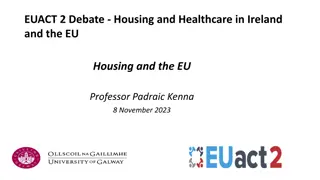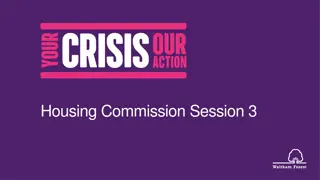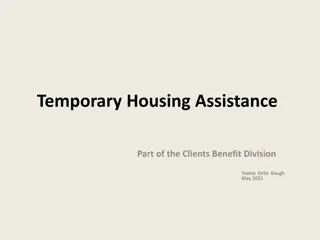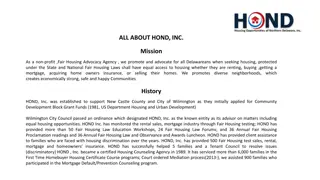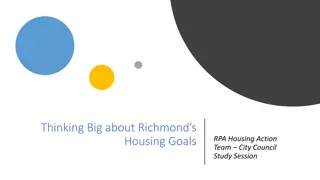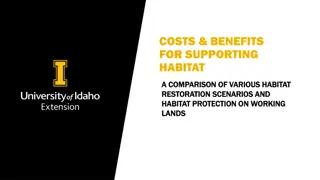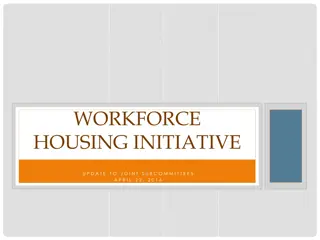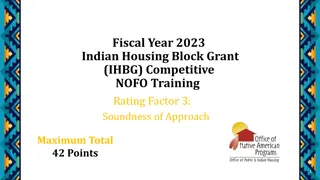Impact Evaluation of UN-Habitat's Housing Approach 2008-2019
The Impact Evaluation of UN-Habitat's Housing Approach assessed the impact of UN-Habitat's efforts in providing adequate, affordable housing, and reducing urban poverty between 2008-2019. The evaluation included regional and country reports, focusing on the effects and impacts of UN-Habitat's Housing Approach. The purpose was to provide insights for policy-making within UN-Habitat and the broader urban development community. The evaluation employed a Theory of Change to analyze the processes and outcomes of the Housing Approach at global, regional, and country levels, with management response pending for implementation of recommendations.
Uploaded on Oct 08, 2024 | 0 Views
Download Presentation

Please find below an Image/Link to download the presentation.
The content on the website is provided AS IS for your information and personal use only. It may not be sold, licensed, or shared on other websites without obtaining consent from the author. Download presentation by click this link. If you encounter any issues during the download, it is possible that the publisher has removed the file from their server.
E N D
Presentation Transcript
Evaluation - Impact evaluation of UN-Habitat s housing approach to adequate, affordable housing and poverty reduction 2008-2019 - Progress on implementation of evaluation recommendations - Evaluation plan 2021 Session D Session D item 4 item 4 15min Martin Barugahare Martin Barugahare Head, Evaluation Wednesday, 25 November 2020
A. IMPACT IMPACT EVALUATION OF UN-HABITAT HOUSING APPROACH evaluation of UN- Habitat s housing approach The first ever UN-Habitat global evaluation to assess impact of UN-Habitat s Housing Approach to Adequate, Affordable Housing and Poverty Reduction. Prioritized in the UN-Habitat process change actions and funded by SIDA. Conducted between July 2019 and June 2020, covered the period of both the 2008-2013 Mid-Term Strategic and Institutional Plan (MTSIP) and the 2014-2019 Strategic Plan (SP). The Evaluation Team comprised a housing specialist, an evaluation specialist, and a development impact evaluation Specialist. Produced four kinds of reports: (i) Four regional reports (Africa, Arab States, Asia and Pacific and Latin America), (ii) two detailed country case studies (Mexico, Zambia), (iii) a Global report, (iv) a synthesis report which provides a summary of key issues and findings presented in global, regional and country reports. The evaluation process is in its final stage of review. UN-Habitat Management will provide a management response on the evaluation report and a detail action plan to implement accepted recommendations.
PURPOSE AND CONTEXT OF THE EVALUATION Intended to assess impact of the UN-Habitat Housing Approach Provides a multi-level (global, regional and country) perspective on the challenges and opportunities for UN-Habitat in the complex, dynamic and rapidly changing urban context. Designed to contribute to the major policy decisions that are being debated within UN-Habitat and more broadly in the urban development community. Findings are of interest to UN-Habitat and its governing bodies, wide range of UN agencies, donors, academics and civil society organizations concerned with housing, poverty and urban development and human rights. A predominant analytical focus of evaluation was: What have been the main effects and impacts of UN-Habitat s Housing Approach in promoting adequate and affordable housing, and reducing urban poverty?
APPROACH AND METHODOLOGY APPROACH AND METHODOLOGY Constructed a Theory of Change, explaining the complex and interactive processes through which the Housing Approach combines its policy, advocacy, knowledge management, technical assistance/capacity building and implementation support tools to achieve its intended outputs, outcomes and impacts. Three levels of analysis country case studies, regional and global data analysis An initial global portfolio analysis enabled the identification of programmes and projects consistent with the Housing Approach to be included in the analysis. Projects and programmes included those that were implemented by the Housing and Slum Upgrading Branch (HSUB), other branches/units within UN-Habitat, and UN- Habitat s regional offices (ROs) and country offices (COs). Several approaches were applied - portfolio analysis, complexity-focused evaluation, and contribution and comparative advantage analysis. Evaluation design included defining and operationalizing the key evaluation questions; defining the UN-Habitat Housing approach; identification of programmes and projects to be covered by evaluation; levels of evaluation; dimensions of evaluation relevance, impact measurement, sustainability and the value-added.
LIMITATIONS LIMITATIONS Limited aggregated quantitative data on the Housing Approach Limited indicators to quantify impact on adequate housing. Most UN-Habitat monitoring data only cover structural indicators at the policy level, and do not capture the numbers of people supported at the country, regional or global level Time and resource constraints did not permit the application of more rigorous evaluation design such as counterfactual analysis and quasi-experimental designs. UN-Habitat projects and programmes are conducted in collaboration with other partners (e.g. government, donors, civil society) so conventional evaluation design would not be able to assess the relative contribution of UN-Habitat compared to other partners. The original plan was to use a contribution analysis framework, but this required the availability of more detailed documentation on the design, implementation and outcomes of each project/programme than was available from UN-Habitat data sources, or that could be collected. Most of the analysis was based on a somewhat less rigorous variation defined as value- added analysis..
WHAT DID EVALUATION FIND? WHAT DID EVALUATION FIND? UN-Habitat's contributions to the housing sector are widely acknowledged among housing stakeholders. UN-Habitat is seen as a leader in knowledge creation and dissemination on housing issues; a consistent advocate for the right to adequate housing; a promoter of transforming the lives of slum dwellers; and for its focus on cross-cutting issues of gender equality, youth and climate change. A number of significant outcomes and impacts have resulted from UN-Habitat s advocacy work and as a convener of global, regional and national events on housing and urban development. While UN-Habitat has produced many influential publications and advocacy statements relating to its housing policies, the Evaluation found the Agency does not have any document defining its Housing Approach or providing guidelines for implementing and evaluating the approach. Operational implementation support provided by UN-Habitat at the country level to: projects; housing programmes; post-crisis recovery and reconstruction interventions, and Slum upgrading and prevention interventions has resulted in very significant outcomes and impacts UN-Habitat collects many sources of housing-related data on its projects, programmes and policies at country, regional and global levels; as well as on broad urban development issues (for example: the City Prosperity Initiative (CPI), the urban and poverty-related SDGs, and the urban observatories among many others).
SLIDE CONTINUED SLIDE CONTINUED The evaluation concurs with the findings of a 2015 Office of Internal Oversight Services (OIOS) In- depth Evaluation of UN-Habitat that while regional and global initiatives and events are well documented, information on country level projects and programmes does not provide consistent complete, and comparable documentation on programme outcomes and impacts. Little reliable information available to assess the extent to which UN-Habitat is achieving its broad development objectives and the intended outcomes and impacts of its country programmes. The evaluation found that the policies, frameworks and procedures for country-level data collection and analysis have already been developed for example, the Project Accrual and Accountability System (PAAS), results-based management (RBM) and logical frameworks (logrames) as well as the evaluation policy framework and the evaluation manual. UN-Habitat s budget and staffing constraints has meant that it has not been possible to systematically implement these data collection and evaluation policies.
WHAT DID EVALUATION RECOMMEND? WHAT DID EVALUATION RECOMMEND? Recommendations from the evaluation are at policy and strategic level, planning and management, regional and country level; and monitoring and evaluation. They relate to: Restore the prominence of housing within UN-Habitat. Strengthening the coherence of the Housing Approach. A greater focus on the development context within which housing programmes operate. Strengthen UN-Habitat s information base. Improving demonstration of impacts. Improving delivery of impacts. Strengthening the focus on improving the living standards of poor and vulnerable groups. Identifying and strengthening areas of comparative advantage. Identifying and addressing the major challenges facing the Housing Approach. Strengthening programme documentation and monitoring. Strengthening evaluation function.
B B. . PROGRESS ON IMPLEMENTATION OF EVALUATION RECOMMENDATIONS PROGRESS ON IMPLEMENTATION OF EVALUATION RECOMMENDATIONS UN-Habitat uses the web-based Evaluation Recommendation Tracking System (ERTS) to monitor implementation of evaluation recommendations. The online tool has proved useful to follow- up of the implementation of UN-Habitat evaluation recommendations. By December 2019, UN-Habitat was tracking 417 recommendations from 54 evaluations. 72.7% were implemented, 21.7% in progress and 4.4% not started and 1.2% expired. It should be noted that this tracking system monitors only UN-Habitat evaluation recommends. Evaluation Unit also tracks the implementation of OIOS and JIU recommendations using their systems.
CATEGORIES OF UN CATEGORIES OF UN- -HABITAT EVALUATIONS AS OF JUNE 2019 HABITAT EVALUATIONS AS OF JUNE 2019 Category Number of recommendations Percentage Planning Implementation Management and administration Participation, Coordination & Cooperation Cross-cutting issues Monitoring, communication, reporting and evaluation Total 56 81 53 58 43 16% 23% 15% 16% 12% 61 352 17% 100%
C: STATUS OF EVALUATIONS CONDUCTED IN 2020 C: STATUS OF EVALUATIONS CONDUCTED IN 2020 No. Title of evaluation TOR Selection and contract Inception phase Data collection Draft report and review Management response 1 Mid-term evaluation of Urban LEDS II 2 Final Evaluation of Project Support for Improving Living Environment and Prevention Capacity in Cambodia 3 End-term Project Evaluation of Fostering Tenure Security and Resilience of Palestinian Communities through Spatial-Economic Planning Interventions in Area C West Bank, Palestine (C) 4 Cluster Evaluation of three UN-Habitat Tranche 10 UNDA projects (C) 5 Evaluation of the Outcomes and Impact of the Tenth Session of the World Urban Forum (WUF10) (C) 6 End-of-Programme Evaluation Support to Land Governance for Peace, Stability and Reconstruction in Eastern DRC Post-conflict (C) 7 Final Evaluation of the Implementation of the United Nations Human Settlements Programme Strategic Plan 2014-2019 (C) 8 End-Term Programme Evaluation of the Kabul Strengthening Municipal Nahias Programme (KSMNP) 2016-2020 (C)
SLIDE CONTINUE SLIDE CONTINUE 9 Mid-Term Evaluation of the Municipal Governance Support Programme (MGSP), 2015 2021 (C) 10 Etudes d Am nagement du corridor urbain des abords de l Autoroute Yaounde-Nsimalen/ End- Term evaluation of Corridor Project, Cameroon 11 Mid-term evaluation Guinea Sustainable Cities Support Programme Evaluation of the Cooperation Agreement Between UN-Habitat and Sweden 2016-2019 (C) Impact Evaluation of UN-Habitat s Housing Approach to Adequate, Affordable Housing and Poverty Reduction 2008-2019Impact Evaluation of UN-Habitat s Housing Approach (C) 12 13 14 Evaluation of UN-Habitat s Policy and Plan (2014- 2019) for Gender Equality and Empowerment of Women in Urban Development and Human Settlements (C) End-of-Project Evaluation Report Making Cities Sustainable and Resilient 2016-2020 (C) Evaluation of the National Urban Policy Program in Bolivia 2017-2020 15 16
D. DRAFT EVALUATION WORK PLAN FOR 2021 D. DRAFT EVALUATION WORK PLAN FOR 2021 The Draft Evaluation Work plan for 2021 was shared. The draft plan will be discussed and updated through consultations and discussions with all divisions and regional offices of UN-Habitat before being presented to the Programme Management Committee for approval. The work plan includes project and programme evaluations, country evaluations, thematic evaluations cluster project evaluations and Joint evaluations. The plan also includes other core evaluation activities that will promote and strengthen the culture of evaluation in UN-Habitat such as supporting self-evaluations and monitoring the implementation of evaluation recommendations. While reporting on results achieved, relevance, efficiency, effectiveness, sustainability, coherence and impact will remain the evaluation criteria of UN-Habitat evaluations, efforts on learning from evaluation will help feed lessons from evaluations into new operations, projects and programmes and improve future outcomes. Quality standards will be applied to evaluations, taking into account United Nations Evaluation Group norms and Standards. The evaluation reports will be supplemented by evaluation briefs, newsletters, videos to increase uptake of evaluations and all completed evaluation reports will be posted on UN-Habitat internet and intranet.
THANK YOU! www.unhabitat.org



